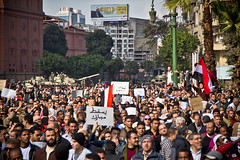Is this how empires end, with people flooding the streets, demanding the resignation of their leaders and forcing local dictators out? Maybe not entirely, but the breadth and depth of the spreading protests, the helplessness of the U.S.-backed governments to stop them, and the rapidly diminishing ability of the United States to protect its long-time clients, are certainly resulting in a level of revolutionary fervor not visible in the Middle East in a generation. The legacy of U.S.-dominated governments across the region will never be the same. The U.S. empire's reach in the resource-rich and strategically vital Middle East has been shaken to its core.
 There's a domino effect underway in the Arab world. Tunisia was the spark, not only because its uprising came first but because the people of Tunisia won and the dictator fled. Egypt remains for the United States the most important strategic Arab ally.
There's a domino effect underway in the Arab world. Tunisia was the spark, not only because its uprising came first but because the people of Tunisia won and the dictator fled. Egypt remains for the United States the most important strategic Arab ally.
The fall of Hosni Mubarak, the U.S.-backed dictator in power for more than three decades, would mean an end to Washington's ability to rely on Cairo to stave off Arab nationalism and independence and an end to Egypt's role as a collaborator in the Israeli occupation of Palestine. Whatever happens, what's likely, though not inevitable, is that never again will Tunisia be used as a transit point or Egypt as a "black site" secret prison for U.S. agents engaged in the "extraordinary rendition" of detainees for interrogation and torture.